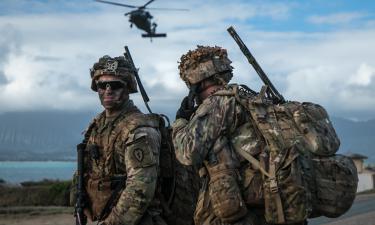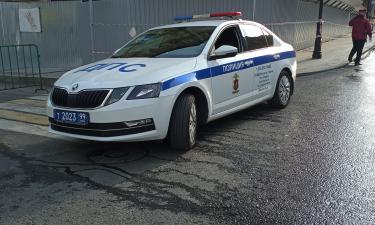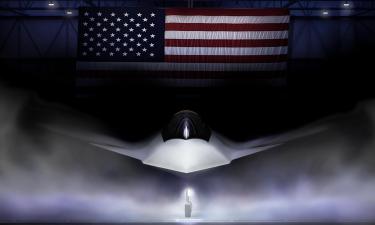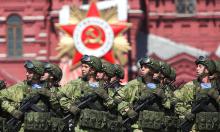Putin: not running for presidency in 2008; contract murders must be solved
President Vladimir Putin reaffirmed Wednesday that he would not try to run again for the presidency, but said he would retain influence over Russia even after leaving office in 2008 as required by the constitution.
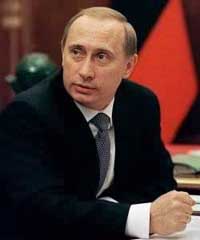
"Even having lost the powers and the levers of presidential power and not tailoring the basic law according to my personal interests, I will manage to retain the most important thing that a person involved in politics must cherish your trust," he said during a nationally televised question-and-answer session. "And using that, you and I will be able to exert influence on the life of our country and guarantee its development."
The immensely popular Putin is constitutionally barred from running for a third consecutive term, but supporters and various regional groups, including in Chechnya, have called for a referendum on amending the country's laws to allow him to stay in power.
"Despite the fact that I like my job, the constitution doesn't allow me to run a third time in a row," Putin told a questioner.
During the broadcast, the Russian leader reeled off positive economic statistics, chided North Korea, pledged to protect agriculture producers and vowed that his government would strictly monitor all companies, including foreign ones, for environmental violations. With his popularity among Russians extremely high, Putin sees the session as an opportunity to show he can respond directly to voters' concerns.
Dressed in a dark blue suit and striped tie and seated at a rectangular table, the Russian president gestured and pointed as he fielded questions, as if giving a lecture.
He vowed that the perpetrators of the recent high-profile killings of top Central Bank regulator Andrei Kozlov and investigative journalist Anna Politkovskaya will be brought to justice. The killings raised new fears that Russia was returning to the violence of the 1990s, when business disputes were commonly solved through gangland style shootings and bombings.
He said contract killings had declined in recent years and asserted that authorities were becoming more successful in cracking down on financial crimes.
"The obligation of the state is to bring any such investigation to the end this concerns the killings of mass media representatives and killings in the economic sphere," Putin said.
Wednesday's program featured correspondents from the state-run television network relaying questions from small crowds in certain cities around the vast country, as well as people phoning in or sending e-mails and text messages. It was his fifth such appearance since coming to office in 2000.
It was impossible to tell whether the questions were arranged in advance or questioners coached, but during past question-and-answer sessions, critics alleged that authorities and state television reporters selected audiences allowed to go live with Putin and screened their questions.
Several Western oil majors that control energy projects in Russia have come under intense environmental scrutiny in recent months, which analysts say reflects a Kremlin drive to increase the state role in the strategic oil and gas sector. Foreign projects facing pressure include Sakhalin-2, a multi-billion-dollar liquefied natural gas development led by Royal Dutch Shell PLC.
"Environmental agencies in collaboration with ecological non-governmental organizations will thoroughly monitor compliance with current legislation," he said.
Putin said Russia's economic growth would reach 6.6 percent this year, noting the government had paid off its Soviet-era debts ahead of time. He said real income had grown about 11 percent this year, but there were continuing problems with slowing productivity and increased imports, which was affecting domestic manufacturing.
"In all, I can say we are satisfied with how the country is developing, including the economy," he said.
On North Korea, Putin said Pyongyang's Oct. 9 nuclear test was "inadmissible," adding that "the way out of the current situation is to return to six-party talks." He also said that pressuring North Korea was counterproductive, and that such an approach could lead the situation into an impasse.
"One should never lead the situation into an impasse, one should never put one of the negotiating sides in a position from which it virtually has no way out but one: an escalation of the situation," he said.
One questioner asked Putin what could be done about local authorities in the northern town of Kondopoga, where a fatal bar fight turned into mob violence against non-Russian migrants this summer underscoring Russia's growing problem of racism, xenophobia and dissatisfaction with illegal immigration. Another woman from the same town complained that farmers were being squeezed out by middlemen.
Putin criticized the local authorities, who he said needed to do more to regulate food and labor markets, reports AP.
"Such authorities are not necessary," Putin said. "Decisions should be made at local level. You must keep this in mind when you vote."
Subscribe to Pravda.Ru Telegram channel, Facebook, RSS!
